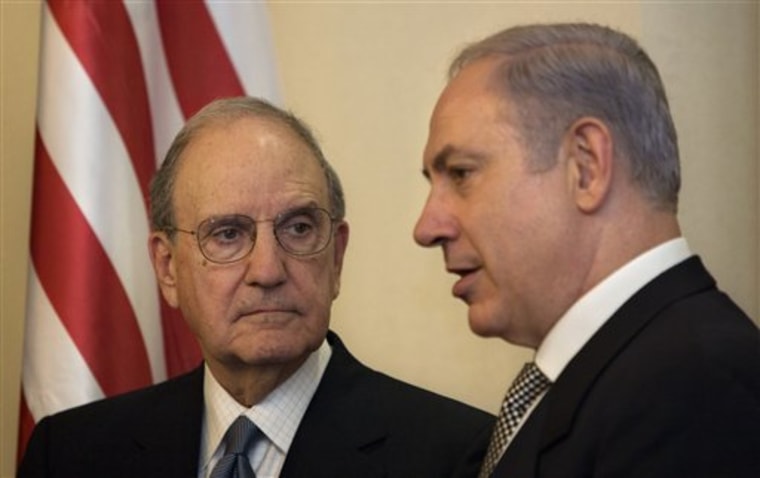The U.S. Mideast envoy returned to the region on Monday, seeking to revive troubled peace efforts after a major setback in which Washington abandoned efforts to coax Israel to freeze Jewish settlement in areas Palestinians want for a future state.
The envoy, George Mitchell, was expected to push the Israelis and Palestinians for progress on key issues at the heart of their conflict. But in a reflection of the difficulties ahead, Mitchell was being forced to meet separately with the sides during the two-day visit, and expectations for a breakthrough were low.
The failure to halt Israeli settlement construction has left President Barack Obama's signature peace effort in embarrassing limbo.
But Israeli Prime Minister Benjamin Netanyahu welcomed the U.S. decision, saying efforts should instead focus on what he called the major issues in the conflict.
"To reach peace, (the sides) must discuss the issues that truly hold up peace," he told a business conference. "I am glad we will begin discussing these issues. We will narrow gaps, and when these gaps are narrowed, we will proceed to direct talks whose objective will be to reach a blueprint for peace."
Netanyahu spoke ahead of his meeting with Mitchell.
Obama personally launched direct negotiations with great fanfare at a White House ceremony on Sept. 2, pledging to broker an agreement to end one of the world's most intractable conflicts within a year. Just three weeks later, that effort collapsed with the end of an earlier Israeli slowdown on settlement construction.
The Palestinians view Israel's continued construction in the West Bank and east Jerusalem — areas they claim for a future, independent state — as a sign of bad faith, and say there is no point in negotiating directly without a freeze. About half a million settlers have moved to the West Bank and east Jerusalem since Israel captured them in the 1967 Mideast war.
Frustrated with the lack of progress, the Palestinians have begun to explore an alternative. The are trying to rally international recognition for a state based on the 1967 boundaries — with or without agreement with Israel. While this would not change the situation on the ground immediately, it would isolate Israel internationally and put heavy pressure for a compromise.
Brazil and Argentina recognized Palestine in recent days.
In Brussels Monday, European Union foreign ministers said they would recognize a Palestinian state "when appropriate," emphasizing the need for a negotiated settlement. Officials said a significant number of member states favor a unilateral declaration of independence for Palestine if the peace process remains stalled. They say leaders will discuss the issue at a summit this week.
The foreign ministers also said they regretted that Israel had not renewed its settlement freeze.
The U.S. spent the past two months trying to persuade Israel to renew the building moratorium, offering a package of military assistance and diplomatic protection at the United Nations.
But last week, American officials said they were abandoning the effort because Israel refused to include east Jerusalem in any freeze and because of uncertainty over what would happen at the end of the proposed 90-day period.
U.S. Secretary of State Hillary Clinton expressed frustration with both sides in a speech Friday, even while insisting the U.S. will keep pressing for a solution. Yet she offered few details on how the Americans hope to break the impasse.
Mitchell met Netanyahu late Monday and officials close to the Israeli leader said they were hoping to hear the envoy's ideas on how to move forward.
Clinton has said she wants to push the parties to address "core issues" that have repeatedly scuttled two decades of peace efforts: the final borders between Israel and a future Palestine, the fate of millions of Palestinian refugees displaced as a result of Israel's creation in 1948, and resolving the disputing claims to east Jerusalem, home to sensitive Jewish, Muslim and Christian holy sites.
